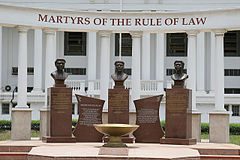Ghana’s Supreme Court has in a unanimous decision ruled that courts in the land are to sit on weekends and public holidays to deal with issues that affect personal liberties.
The ruling put to rest the age-old practice where suspects are arrested and detained beyond 48 hours because weekends and holidays are not counted.
The seven-member panel presided over by outgoing Chief Justice Sophia Akuffo on Wednesday in Accra held that 48 hours mean 48 hours.
A private legal practitioner Martin Kpebu in September 2016 dragged the Attorney General to the Apex Court demanding a declaration that portions of the Holidays Act that bar the courts from dealing with cases that affect personal liberty are unconstitutional.
Chief Justice Akuffo presided over the panel which comprises Justices Julius Ansah, Anin Yeboah (Chief Justice Designate), Baffoe Bonnie, Sule Gbadegbe, A. A Benin, and Prof. Ashie Kotey.
The ruling is her last as a Justice of the Supreme Court of Ghana.
Reading the judgments, she stated that portions of the Holidays Act preventing such access to justice are unconstitutional.
The court then rectified the provisions to exempt courts dealing with personal liberty cases as part of those who can work on holidays.
The court ordered that the Chief Justice must within six months designate each Metropolitan, Municipal and District Assembly with the required number of courts as may be needed to sit on weekends and holidays to deal with cases affecting personal liberties.
The court again ordered that the IGP sensitises police prosecutors about this decision within six months.
In addition the court ordered that the Inspector General of Police (IGP) sensitises police prosecutors about this decision within six months.
While the director of the Judicial Training Institute is also asked to do the same for judges and magistrates in the country.
Some social commentators have described the decision as a landmark move in justice delivery system of the country because the police used non-sittings on weekends and public holidays by the court to settle personal scores with people who challenge them over their rights.
DAP/as/APA


